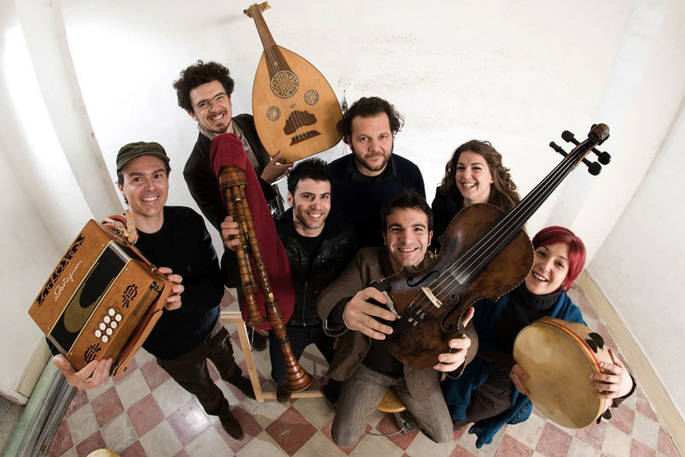


Journalist and critic George De Stefano recently published an article with a very intriguing title: “Dances with Spiders: Italian Roots Music, With Bite, Comes to North America [2].” The topic: “the pizzica tarantata, a folk music born in the Salento peninsula of Italy’s deep south, way down in the heel of the boot.”
The pizzica is the music that marked the ancient healing ritual against the bite of a tarantula, the dangerous poisonous spider. According to tradition, in order to drive out the demon thought to have taken possession of the victim, usually a woman, tambourines should be beaten incessantly. The dizzily rhythmic sound of the tambourine combined with a frenzied hypnotic dance healed the victim of the poison.
“This intensely rhythmic idiom, which has been likened to the blues and zydeco,” De Stefano continues, “originally was the music played in the spiritual healing rituals of impoverished peasants and laborers. Today the pizzica is an emblem of cultural identity for the people of Salento, a feature of the world music scene, and a generator of tourism and revenue for Italy’s Puglia region, of which Salento is the southernmost part. Every August since 1998, thousands of music fans have been heading to the Salento town of Melpignano for the annual La Notte della Taranta [3] one of Europe’s major festivals, and, along with WOMAD, its leading world music gathering.” La Notte della Taranta is the greatest musical festival dedicated to the Salentine pizzica, combined with other music genres, from world music to rock, from jazz to symphonic music.
Now, North American audiences will get a chance to experience some of its excitement when one of its mainstay bands, Canzoniere Grecanico Salentino [4] (CGS) makes its US and Canadian debut on an 11-city tour that opens 15 September at the New York Gypsy Festival and concludes October 8 at the National Geographic in Washington, DC. Other dates include Chicago (two days at the World Music Festival), Boston, Philadelphia, Toronto, and Quebec.
Italy’s fascinating dichotomy of tradition and modernity come together in the music of Canzoniere Grecanico Salentino. “CGS, was born in 1975 from an idea by Rina Durante (an intellectual from Salento), sprung from the cultural and political folk revival of the 70s. Among its founders there were my father, guitarist and mandolinist Daniele Durante and my mother Rossella Pinto,” Mauro Durante, the group's current leader said when interviewed, “It's pretty clear that my home has always been permeated by this music and ethnomusicological sounds. Our challenge was and still is to find a form of expression that makes this music current and captivating, without corrupting its original beauty and purity.”
Indeed, in 2007, Daniele Durante passed the leadership of CGS to his son, Mauro, who had joined the band at 14 as a percussionist and violinist. “A conservatory-trained musician, Mauro Durante is a scholar of pizzica and its various techniques as well as a virtuoso instrumentalist,” continues De Stefano.
Hailing from the Puglia region, the seven piece band and dancer are the leading exponents in a new wave of young performers re-inventing Southern Italy’s Pizzica Taranta musical and dance traditions for today’s global audience.
“Our music is strictly linked to dancing, a movement driven by the obsessive rhythm of the tambourine, that, just like a pulsating heart, envelops and seduces you, making it impossible to stand still. This is a music that is the pure emanation, that comes from the love for your own country, it comes from the past but it is felt and performed in the present and looks at the future with energy and rhythm,” Mauro explains.
As evidenced by the critical attention in Italian-American filmmaker John Turturro’s documentation of the Naples music scene in Passione [5], there is a strong interest in the rediscovery and restoration of one’s roots and identity through traditional musical forms. Few bands have represented Salento and its culture as long and devotedly as Canzoniere Grecanico Salentino, whose name translates roughly as the Salentine Greek Songbook, 'Grecanico' referring to the ancient Greek-derived language spoken in southern Puglia and parts of Calabria. In its three decade-plus history, CGS has recorded 16 albums and played countless shows in Salento and Italy, throughout Europe, and the Middle East.
Canzoniere Grecanico Salentino’s debut North American tour will bite US audiences and capture all with an explosion of energy, passion, rhythm and mystery, which brings us all from the past into modernity, and back.
Source URL: http://test.iitaly.org/magazine/focus/art-culture/article/cgs-bringing-power-taranta-north-america
Links
[1] http://test.iitaly.org/files/cgs1315423723jpg
[2] http://www.popmatters.com/pm/feature/146622-dances-with-spiders
[3] http://www.lanottedellataranta.it
[4] http://www.canzonieregrecanicosalentino.net/
[5] http://www.passionefilm.com